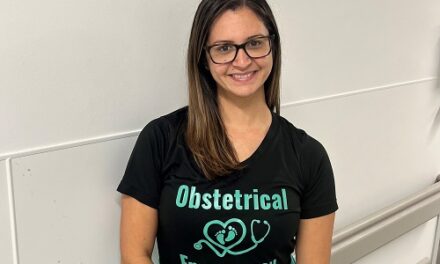 In South Florida, where hurricane disasters are a fact of life, hospitals are a critical community resource. But in a disaster, when they are most essential, hospitals are themselves vulnerable. Keeping them safe and operational is imperative for effective disaster response, not only to protect staff and patients but also to continue to provide care, avoid evacuations and enable the hospital to receive and treat the newly injured. Hurricane preparedness is no simple matter for highly complex hospital facilities, but the first and most important line of defense is the physical structure itself.
In South Florida, where hurricane disasters are a fact of life, hospitals are a critical community resource. But in a disaster, when they are most essential, hospitals are themselves vulnerable. Keeping them safe and operational is imperative for effective disaster response, not only to protect staff and patients but also to continue to provide care, avoid evacuations and enable the hospital to receive and treat the newly injured. Hurricane preparedness is no simple matter for highly complex hospital facilities, but the first and most important line of defense is the physical structure itself.
According to John Kuncher, Vice-president of Field Operations for ANF Group, Inc., the majority of hospitals in hurricane-prone regions can be modified to withstand the force of hurricanes through a process of encapsulation. “Hurricane retrofitting,” he explains, strengthens the exterior of a building in order to protect the interior. “Essentially, retrofitting means hardening the shell of the building,” Kuncher says. “The positive and negative forces of hurricane winds, plus flying debris, can cause great damage to a building. Wind can shatter windows, break doors, and demolish or lift off a roof. A hospital cant risk that level of damage, which endangers the staff and patients and disrupts operations. We basically encapsulate it, upgrading the envelope of the buildings to a specific level so that they can better withstand hurricane winds. Our goal is to keep the hospital operating.”
Images of the Hurricane Katrina aftermath, in which patients died in severely damaged hospitals and nursing homes, stunned the American public and raised awareness of the need to strengthen essential healthcare facilities to defend against natural disasters. “Hurricanes Katrina and Wilma opened everyones eyes,” says Kuncher. “They taught us that even concrete block walls are not hurricane-resistant unless theyre properly reinforced.”
With an emphasis on the roof, windows, doors and walls, ANF Group assesses the buildings vulnerabilities and develops a customized plan to address them. Starting at the roof, where fans and other large equipment is often located, ANF professionals make certain that everything is secure and that the roof can resist the wind uplift that might otherwise pull it loose. Exterior doors and windows are reinforced so that they are impenetrable to debris and able to withstand specific wind velocity.
The ANF Group completed a total external hurricane retrofitting project for Memorial Hospital West in Pembroke Pines, and is currently constructing a new, world-class pediatric facility for the Joe DiMaggio Childrens Hospital in Hollywood.
ANF Group is a family-owned construction and development company that specializes in health care facilities and commercial buildings. Founded almost thirty years ago by Al Fernandez Sr., it has evolved into one of Floridas pre-eminent construction firms. With an outstanding reputation for excellence, integrity and accountability, ANF Group is the clear choice for hospitals and healthcare facilities that seek the most advanced, leading-edge solutions to the challenges of operational continuity in disasters.
The ANF Group offers substantial advantages to clients. With a vast body of experience, the ANF team has the expertise plus the latest technology to develop solutions to meet each facilitys needs. “We do this work on a large scale,” says Kuncher. “We specialize in health care. Were extremely thorough and exceptionally responsive to clients; our owners, Al and Nelson Fernandez and Vice-president Alberto Gil, are hands-on and highly accountable. Our clients know that they can call any of the owners anytime and theyll take the call and be there as quickly as possible if they have a concern. Theyre dedicated to their clients and employees.”
Kuncher is a veteran of the construction industry with almost 40 years of experience, much of it in healthcare construction. He monitors the progress and quality of the work at ANF construction sites. “Our best feedback from our clients is repeat work,” Kuncher says. “Clients come back to us again and again. We do exactly what we promise. When a hospital contacts us, we set up a meeting to evaluate their facility. We discuss how we can make them safer. Each one is unique.”
A hospital has symbolic meaning for a community, as a place of sanctuary and care, and a stable, functional facility stands as a sign of hope and security amidst the devastation of natural disaster. For the community and the hospital staff, who may be less able to focus on the work at hand if their own personal safety is threatened, hospital retrofitting delivers peace of mind.
A hospital that has been retrofitted by the ANF Group will better withstand the destructive winds of a hurricane, to the category it was designed for, and remain functional when it is most needed. Retrofitting enables operational continuity, reduces losses and gives a hospital a competitive edge. As John Kuncher sees it, this is much more than a good business decision. “In Florida, people have a choice of many hospitals. If you or your loved one needs hospital care, which one are you going to choose the one that can stand up to hurricane winds, that provides a safe environment during disaster conditions, or one that is unprotected?”
Post Views: 1,007
 In South Florida, where hurricane disasters are a fact of life, hospitals are a critical community resource. But in a disaster, when they are most essential, hospitals are themselves vulnerable. Keeping them safe and operational is imperative for effective disaster response, not only to protect staff and patients but also to continue to provide care, avoid evacuations and enable the hospital to receive and treat the newly injured. Hurricane preparedness is no simple matter for highly complex hospital facilities, but the first and most important line of defense is the physical structure itself.
In South Florida, where hurricane disasters are a fact of life, hospitals are a critical community resource. But in a disaster, when they are most essential, hospitals are themselves vulnerable. Keeping them safe and operational is imperative for effective disaster response, not only to protect staff and patients but also to continue to provide care, avoid evacuations and enable the hospital to receive and treat the newly injured. Hurricane preparedness is no simple matter for highly complex hospital facilities, but the first and most important line of defense is the physical structure itself. 

























